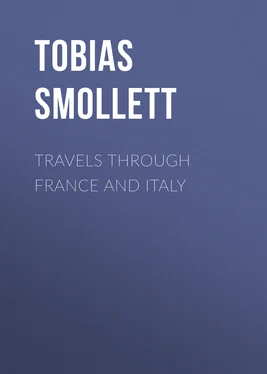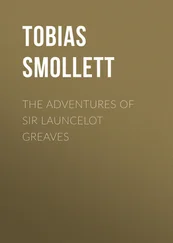Tobias Smollett - Travels through France and Italy
Здесь есть возможность читать онлайн «Tobias Smollett - Travels through France and Italy» — ознакомительный отрывок электронной книги совершенно бесплатно, а после прочтения отрывка купить полную версию. В некоторых случаях можно слушать аудио, скачать через торрент в формате fb2 и присутствует краткое содержание. Жанр: Путешествия и география, История, foreign_edu, foreign_antique, foreign_prose, на английском языке. Описание произведения, (предисловие) а так же отзывы посетителей доступны на портале библиотеки ЛибКат.
- Название:Travels through France and Italy
- Автор:
- Жанр:
- Год:неизвестен
- ISBN:нет данных
- Рейтинг книги:5 / 5. Голосов: 1
-
Избранное:Добавить в избранное
- Отзывы:
-
Ваша оценка:
- 100
- 1
- 2
- 3
- 4
- 5
Travels through France and Italy: краткое содержание, описание и аннотация
Предлагаем к чтению аннотацию, описание, краткое содержание или предисловие (зависит от того, что написал сам автор книги «Travels through France and Italy»). Если вы не нашли необходимую информацию о книге — напишите в комментариях, мы постараемся отыскать её.
Travels through France and Italy — читать онлайн ознакомительный отрывок
Ниже представлен текст книги, разбитый по страницам. Система сохранения места последней прочитанной страницы, позволяет с удобством читать онлайн бесплатно книгу «Travels through France and Italy», без необходимости каждый раз заново искать на чём Вы остановились. Поставьте закладку, и сможете в любой момент перейти на страницу, на которой закончили чтение.
Интервал:
Закладка:
In Letter XIII. Smollett settles down to give his correspondents a detailed description of the territory and people of Nice. At one time it was his intention to essay yet another branch of authorship and to produce a monograph on the natural history, antiquities, and topography of the town as the capital of this still unfamiliar littoral; with the late-born modesty of experience, however, he recoils from a task to which he does not feel his opportunities altogether adequate. [See p. 152.] A quarter of Smollett's original material would embarrass a "Guide"-builder of more recent pattern.
Whenever he got near a coast line Smollett could not refrain from expressing decided views. If he had lived at the present day he would infallibly have been a naval expert, better informed than most and more trenchant than all; but recognizably one of the species, artist in words and amateur of ocean-strategy. [Smollett had, of course, been surgeon's mate on H.M.S. Cumberland, 1740-41.] His first curiosity at Nice was raised concerning the port, the harbour, the galleys moored within the mole, and the naval policy of his Sardinian Majesty. His advice to Victor Amadeus was no doubt as excellent and as unregarded as the advice of naval experts generally is. Of more interest to us is his account of the slave-galleys. Among the miserable slaves whom "a British subject cannot behold without horror and compassion," he observes a Piedmontese count in Turkish attire, reminding the reader of one of Dumas' stories of a count among the forcats. To learn that there were always volunteer oarsmen among these poor outcasts is to reflect bitterly upon the average happiness of mankind. As to whether they wore much worse off than common seamen in the British navy of the period (who were only in name volunteers and had often no hope of discharge until they were worn out) under such commanders as Oakum or Whiffle [In Roderick Random.] is another question. For confirmation of Smollett's account in matters of detail the reader may turn to Aleman's Guzman d'Afarache, which contains a first-hand description of the life on board a Mediterranean slave galley, to Archenholtz's Tableau d'Italie of 1788, to Stirling Maxwell's Don John of Austria (1883, i. 95), and more pertinently to passages in the Life of a Galley Slave by Jean Marteilhe (edited by Miss Betham-Edwards in 1895). After serving in the docks at Dunkirk, Marteilhe, as a confirmed protestant, makes the journey in the chain-gang to Marseilles, and is only released after many delays in consequence of the personal interest and intervention of Queen Anne. If at the peace of Utrecht in 1713 we had only been as tender about the case of our poor Catalan allies! Nice at that juncture had just been returned by France to the safe-keeping of Savoy, so that in order to escape from French territory, Marteilhe sailed for Nice in a tartane, and not feeling too safe even there, hurried thence by Smollett's subsequent route across the Col di Tende. Many Europeans were serving at this time in the Turkish or Algerine galleys. But the most pitiable of all the galley slaves were those of the knights of St. John of Malta. "Figure to yourself," wrote Jacob Houblon [The Houblon Family, 1907 ii. 78. The accounts in Evelyn and Goldsmith are probably familiar to the reader.] about this year, "six or seven hundred dirty half-naked Turks in a small vessel chained to the oars, from which they are not allowed to stir, fed upon nothing but bad biscuit and water, and beat about on the most trifling occasion by their most inhuman masters, who are certainly more Turks than their slaves."
After several digressions, one touching the ancient Cemenelion, a subject upon which the Jonathan Oldbucks of Provence without exception are unconscionably tedious, Smollett settles down to a capable historical summary preparatory to setting his palette for a picture of the Nissards "as they are." He was, as we are aware, no court painter, and the cheerful colours certainly do not predominate. The noblesse for all their exclusiveness cannot escape his censure. He can see that they are poor (they are unable to boast more than two coaches among their whole number), and he feels sure that they are depraved. He attributes both vices unhesitatingly to their idleness and to their religion. In their singularly unemotional and coolly comparative outlook upon religion, how infinitely nearer were Fielding and Smollett than their greatest successors, Dickens and Thackeray, to the modern critic who observes that there is "at present not a single credible established religion in existence." To Smollett Catholicism conjures up nothing so vividly as the mask of comedy, while his native Calvinism stands for the corresponding mask of tragedy. [Walpole's dictum that Life was a comedy to those who think, a tragedy for those who feel, was of later date than this excellent mot of Smollett's.] Religion in the sunny spaces of the South is a "never-failing fund of pastime." The mass (of which he tells a story that reminds us of Lever's Micky Free) is just a mechanism invented by clever rogues for an elaborate system of petty larceny. And what a ferocious vein of cynicism underlies his strictures upon the perverted gallantry of the Mariolaters at Florence, or those on the two old Catholics rubbing their ancient gums against St. Peter's toe for toothache at Rome. The recurring emblems of crosses and gibbets simply shock him as mementoes of the Bagne.
At Rome he compares a presentment of St. Laurence to "a barbecued pig." "What a pity it is," he complains, "that the labours of painting should have been employed on such shocking objects of the martyrology," floggings, nailings, and unnailings… "Peter writhing on the cross, Stephen battered with stones, Sebastian stuck full of arrows, Bartholomew flayed alive," and so on. His remarks upon the famous Pieta of Michael Angelo are frank to the point of brutality. The right of sanctuary and its "infamous prerogative," unheard of in England since the days of Henry VII., were still capable of affording a lesson to the Scot abroad. "I saw a fellow who had three days before murdered his wife in the last month of pregnancy, taking the air with great composure and serenity, on the steps of a church in Florence." Smollett, it is clear, for all his philosophy, was no degenerate representative of the blind, unreasoning seventeenth-century detestation of "Popery and wooden shoes."
Smollett is one of the first to describe a "conversazione," and in illustration of the decadence of Italian manners, it is natural that he should have a good deal to tell us about the Cicisbeatura. His account of the cicisbeo and his duties, whether in Nice, Florence, or Rome, is certainly one of the most interesting that we have. Before Smollett and his almost contemporary travel correspondent, Samuel Sharp, it would probably be hard to find any mention of the cicisbeo in England, though the word was consecrated by Sheridan a few years later. Most of the "classic" accounts of the usage such as those by Mme. de Stael, Stendhal, Parini, Byron and his biographers date from very much later, when the institution was long past its prime if not actually moribund. Now Smollett saw it at the very height of its perfection and at a time when our decorous protestant curiosity on such themes was as lively as Lady Mary Montagu had found it in the case of fair Circassians and Turkish harems just thirty years previously. [A cicisbeo was a dangler. Hence the word came to be applied punningly to the bow depending from a clouded cane or ornamental crook. In sixteenth-century Spain, home of the sedan and the caballero galante, the original term was bracciere. In Venice the form was cavaliere servente. For a good note on the subject, see Sismondi's Italian Republics, ed. William Boulting, 1907, p. 793.] Like so much in the shapes and customs of Italy the cicisbeatura was in its origin partly Gothic and partly Oriental. It combined the chivalry of northern friendship with the refined passion of the South for the seclusion of women. As an experiment in protest against the insipidity which is too often an accompaniment of conjugal intercourse the institution might well seem to deserve a more tolerant and impartial investigation than it has yet received at the hands of our sociologists. A survival so picturesque could hardly be expected to outlive the bracing air of the nineteenth century. The north wind blew and by 1840 the cicisbeatura was a thing of the past.
Читать дальшеИнтервал:
Закладка:
Похожие книги на «Travels through France and Italy»
Представляем Вашему вниманию похожие книги на «Travels through France and Italy» списком для выбора. Мы отобрали схожую по названию и смыслу литературу в надежде предоставить читателям больше вариантов отыскать новые, интересные, ещё непрочитанные произведения.
Обсуждение, отзывы о книге «Travels through France and Italy» и просто собственные мнения читателей. Оставьте ваши комментарии, напишите, что Вы думаете о произведении, его смысле или главных героях. Укажите что конкретно понравилось, а что нет, и почему Вы так считаете.












